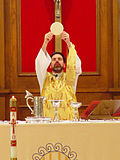- Offertory
-
"Collection plate" redirects here. For the notice fixed to a post box, see collection plate (postal).
The Offertory is the portion of a Eucharistic service when bread and wine are brought to the altar. The offertory exists in many liturgical Christian denominations, though the Eucharistic theology varies among celebrations conducted by these denominations.
The collection of alms from the congregation often coincides with the offering of bread and wine, and the collection of alms is sometimes used in lieu of the offertory at non-eucharistic services. The English word "Offertory" is derived from the ecclesiastical Latin offertorium, and the French offertoire, a place to which offerings were brought.
Contents
Liturgical action
At this point in a eucharist bread and wine are brought to the altar or communion table. In some churches it is the custom for members of the congregation to bring the bread and wine from the nave of the church to the sanctuary. The altar is prepared and, in some churches, censed.
Music
At this point in a Roman Catholic mass, an offertory chant is appointed to be said or sung. The 1662 Book of Common Prayer of the Church of England includes "offertory sentences" that are to be read at this point. Current practice in Anglican churches favours the singing of a congregational hymn (the "offertory hymn") or an anthem sung by the choir. In some churches the music at the offertory is provided by an organist.
In the Roman Rite Mass the Offertory in the early Middle Ages consisted in chant verses sung by a soloist and accompanied by a refrain sung by the choir. Because the collecting of material offerings gradually fell out of use, the verses were eventually abolished. In the Roman Missal of St. Pius V (Tridentine) and already centuries before Pius V's codification, the Offertory was reduced to the singing of the refrain only. The priest recites the (refrain of the) Offertory chant privately after the Dominus vobiscum. He then proceeds with the preparing of the gifts (bread and wine) on the altar, along with incensing the altar.
Collection of alms
A collection plate is often used near the end of some Protestant worship services to gather the gifts of the faithful for the support of the church and for charity. Members of other assemblies, including some Lutheran churches, do not use a collection plate, but simply make arrangements to support their church without the temptation of using the collection plate for a public show of piety.
In the Roman Catholic Mass the collection plate is replaced by a basket which is passed among the faithful immediately following the Liturgy of the Word at the offertory. In the Ordinary Form of the Roman Mass (Pauline Rite), a family or group selected before the Mass (such as the Knights of Columbus) then approach the priest with these monetary gifts as well as the unconsecrated host and sacramental wine—which are laid under the altar before beginning the Liturgy of the Eucharist. This spiritually unites the sacrifice of the people with the pure oblation who is the Eucharistic Christ.
References
 This article incorporates text from a publication now in the public domain: Chisholm, Hugh, ed (1911). Encyclopædia Britannica (11th ed.). Cambridge University Press.
This article incorporates text from a publication now in the public domain: Chisholm, Hugh, ed (1911). Encyclopædia Britannica (11th ed.). Cambridge University Press.
Gregorian chants of the Roman Mass Ordinary Kyrie · Gloria · Credo · Sanctus · Agnus Dei · Ite missa est , Benedicamus Domino or Requiescant in pace
Proper Accentus Order of the Divine Service in Lutheranism Preparatory Service Entrance hymn and Trinitarian formula (known as the Invocation) · Penitential Rite including the Confiteor and Declaration of Grace (or Asperges on Easter)
The Service of the Word Introit · Gloria Patri · Kýrie · Gloria · Dominus Vobiscum · Oremus · Collect · Old Testament reading · gradual (or Responsorial Psalm) · Epistle · Alleluia (tract during Lent) · Gospel · Hymn of the day · Homily or Postil (Sermon) · Nicene Creed (Athanasian Creed on Trinity Sunday) · Offertory · Prayers of the FaithfulThe Service of the Eucharist Preface (Sursum corda / Sanctus / Hosanna) · Eucharistic Prayer (Epiclesis / Words of Institution / Memorial Acclamation) · Lord's Prayer · Sign of peace / pax (elevation) · Agnus Dei · Distribution · Nunc dimittis · Postcommunion · Benedicamus Domino · Benediction · Dismissal · Ite missa estParticipants Parts of the Sanctuary altar · altar bell · altar crucifix · altar rails · kneeler · piscina · processional cross · tabernacleCandles Liturgical vessels Liturgical objects collection basket · holy water · incense (use) · paten · sacramental bread (wafer) · sacramental wine · thuribleVestments Liturgical books and hymnals Agenda · Evangelical Lutheran Hymn-Book · Evangelical Lutheran Worship · Lutheran Book of Worship · Lutheran Hymnal · Lutheran Hymnal with Supplement · Lutheran Service Book · Lutheran Worship · Service Book and HymnalCategories:- Christian liturgy, rites, and worship services
- Christian music
- Structure of the Mass
- Sacramentals
- Fundraising
- Christian terms
Wikimedia Foundation. 2010.

